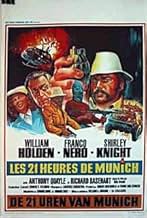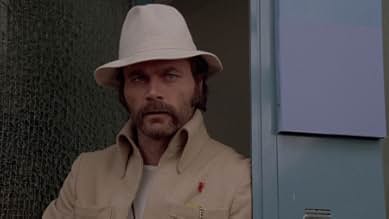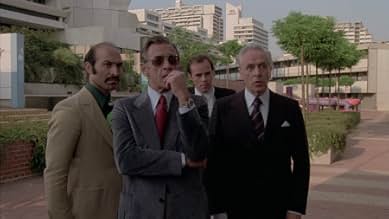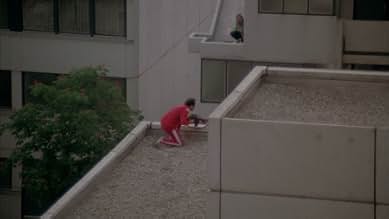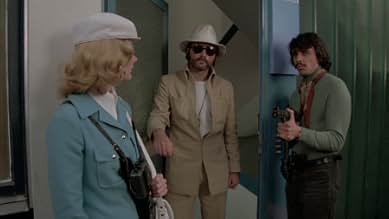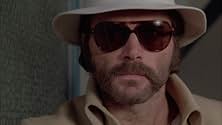IMDb RATING
6.3/10
1.4K
YOUR RATING
A dramatization of the incident in 1972 when Arab terrorists broke into the Olympic compound in Munich and murdered eleven Israeli athletes.A dramatization of the incident in 1972 when Arab terrorists broke into the Olympic compound in Munich and murdered eleven Israeli athletes.A dramatization of the incident in 1972 when Arab terrorists broke into the Olympic compound in Munich and murdered eleven Israeli athletes.
- Director
- Writers
- Stars
- Nominated for 2 Primetime Emmys
- 3 nominations total
Djamchid 'Jim' Soheili
- Touny
- (as Djamchid Soheili)
- Director
- Writers
- All cast & crew
- Production, box office & more at IMDbPro
6.31.3K
1
2
3
4
5
6
7
8
9
10
Featured reviews
The terror olympics
The film does a good job of depicting the terrorist attack on Israeli athletes at the 1972 Olympics. Unlike "Munich" which only spends a few minutes dramatizing the terror attacks & spends the rest of the film on Mossad actions tracking down the terrorists, this film shows the horror of the terror attack.
A much better film on the subject is the documentary "One Day in September" (1999) which won an Oscar for best documentary. The film does a good job of showing the ineptitude of German police forces & the intransigence of the IOC, which would not suspend the games for even one day while the terrorists murdered athletes & held others hostage.
A much better film on the subject is the documentary "One Day in September" (1999) which won an Oscar for best documentary. The film does a good job of showing the ineptitude of German police forces & the intransigence of the IOC, which would not suspend the games for even one day while the terrorists murdered athletes & held others hostage.
Adequate and interesting recreation of the infamous 1972 massacre into the Olympic compound at Munich
Made-for-TV treatment of the slaughter of the Israeli sportsmen by Arab terrorists , being based on real events about one of the most violent episodes in the history of terrorism. It happened at 4:09 am on September 5, 1972 , as eleven Olympic athletes were taken hostages by terrorists. For the next 21 hours the World held its breath.. Israeli goverment presided by Golda Meier follows its policy of no negotiation with terrorists. As some German authorities : William Holden , Shirley Knight , Noel Willman have to negotiate with the Palestinian , but things go wrong .
Nice and well-made reenacting of the infamous attack on Israeli athletes and coaches in the Olympic village is competently chronicled with good actors , adequate period detail and in semi-documentary style , as well as adding some stock footage . The movie was produced using the actual Munich location. Main and support cast are pretty good . As William Holden gives a sober and serious acting , adequate Shirley Knight , an appropiate Richard Basehart as Chancellor Willy Brandt , Noel Willman as Interior Minister , Paul Smith an Israeli hunk coach being kidnapped and Anthony Quayle as General Zamir . Special mention for Franco Nero who steals the spectacle as an extremely nasty terrorist who really shows a deep hateful against Jews . The motion picture was compellingly professionally directed by William A Graham (Amazing Howard Hughes , Birds of Prey , Change of habit , Deadly encounter, Doomsday Fight , Harry Tracy, Mr Inside Mr Outside, Waterhole) . Rating 7/10 , above average . Worthwhile watching .
Nice and well-made reenacting of the infamous attack on Israeli athletes and coaches in the Olympic village is competently chronicled with good actors , adequate period detail and in semi-documentary style , as well as adding some stock footage . The movie was produced using the actual Munich location. Main and support cast are pretty good . As William Holden gives a sober and serious acting , adequate Shirley Knight , an appropiate Richard Basehart as Chancellor Willy Brandt , Noel Willman as Interior Minister , Paul Smith an Israeli hunk coach being kidnapped and Anthony Quayle as General Zamir . Special mention for Franco Nero who steals the spectacle as an extremely nasty terrorist who really shows a deep hateful against Jews . The motion picture was compellingly professionally directed by William A Graham (Amazing Howard Hughes , Birds of Prey , Change of habit , Deadly encounter, Doomsday Fight , Harry Tracy, Mr Inside Mr Outside, Waterhole) . Rating 7/10 , above average . Worthwhile watching .
Wordy, but believable
A semi-documentary movie about the terrorist attack on the Israeli team at the Olympic Games at Munich 1972.
In opposite to later adaptations of the same historical event, "21 Hours at Munich" was shot on the original locations. However, it is a little bit less of a documentary than it seems at first, it does take a bit of creative freedom in the narration. Which has been criticized by some reviewers, but makes it a better movie after all. Excellent performances by William Holden as the police chief and Franco Nero as the terrorist leader, whose motivation is explained remarkably well. He is not just the one-dimensional Hollywood villain firing bullets in all directions. That was important to make the film believable, as well as the discussions between the politicians. Even it makes the movie quite wordy, the reasons why and when and how the police fights the terrorists are explained well. "21 Hours at Munich" is a movie you should watch, first for the tragic history that hopefully will never be repeated, second for its solid story telling and acting which is above the genre average.
In opposite to later adaptations of the same historical event, "21 Hours at Munich" was shot on the original locations. However, it is a little bit less of a documentary than it seems at first, it does take a bit of creative freedom in the narration. Which has been criticized by some reviewers, but makes it a better movie after all. Excellent performances by William Holden as the police chief and Franco Nero as the terrorist leader, whose motivation is explained remarkably well. He is not just the one-dimensional Hollywood villain firing bullets in all directions. That was important to make the film believable, as well as the discussions between the politicians. Even it makes the movie quite wordy, the reasons why and when and how the police fights the terrorists are explained well. "21 Hours at Munich" is a movie you should watch, first for the tragic history that hopefully will never be repeated, second for its solid story telling and acting which is above the genre average.
Good Film
21 Hours at Munich (1976)
*** (out of 4)
Pretty good made for TV movie about the 1972 Olympics in Munich, Germany where Arab terrorists kidnapped and murdered eleven Israeli athletes. I don't know the entire history of the events surrounding this attack but if this film stays true to what really happened then I can't help but blame the German government and their security at the Olympics. I really couldn't believe how stupid some of the decisions made where and I really wonder what this event would do in today's world where God knows there's a lot more media. As for the film itself, it's entertaining throughout but it never gets too dramatic and the direction lacks any real style or flair. William Holden gives a good performance as the head Munich guy trying to get everything done while Franco Nero steals the show as the head terrorist. Nero is downright brilliant in his part with a look that could kill. I liked how Nero played the part of a thinking man and this really comes across well.
*** (out of 4)
Pretty good made for TV movie about the 1972 Olympics in Munich, Germany where Arab terrorists kidnapped and murdered eleven Israeli athletes. I don't know the entire history of the events surrounding this attack but if this film stays true to what really happened then I can't help but blame the German government and their security at the Olympics. I really couldn't believe how stupid some of the decisions made where and I really wonder what this event would do in today's world where God knows there's a lot more media. As for the film itself, it's entertaining throughout but it never gets too dramatic and the direction lacks any real style or flair. William Holden gives a good performance as the head Munich guy trying to get everything done while Franco Nero steals the show as the head terrorist. Nero is downright brilliant in his part with a look that could kill. I liked how Nero played the part of a thinking man and this really comes across well.
Evil Visits Munich
21 Hours At Munich tells the tragic story of the Black September terrorists who took Israeli athletes hostage at the 1972 Olympics and issued a demand to the government of Israel that a couple of hundred of their comrades be freed for the lives of these athletes. It was a story that gripped the world at the time and is still sadly relevant for today.
This was a new phenomenon at the time, mindless terrorist acts against civilians and governments then and now can't quite come to grips with the concept of pure evil wrapped in a political cause. Black September no doubt picked the target as Munich not only because of the Olympics, but because of the special significance the city has in the rise of Adolph Hitler. Maybe they thought some sympathy from the authorities might linger from Nazi days.
In that they were much mistaken. The West German government was as mortified and embarrassed by the events as anyone else in the civilized world. This was their opportunity to exhibit a post Nazi Germany to the world and it was horrifyingly blown.
William Holden played the head of the Munich PD in charge of dealing with the problem and it's a sincere and level performance he gives. Chancellor Willy Brandt of West Germany is played by Richard Basehart who is the liberal politician who can't grasp even after Hitler there are some folks that just can't be reasoned with. Other performances of note are Franco Nero as the charismatic Black September leader, a picture of homicidal malevolence just itching to kill and Shirley Knight the negotiator for Holden and the Munich PD.
Stephen Spielberg did a great job in putting this film together which should be required viewing for those finding justice in brutal acts of homicide.
This was a new phenomenon at the time, mindless terrorist acts against civilians and governments then and now can't quite come to grips with the concept of pure evil wrapped in a political cause. Black September no doubt picked the target as Munich not only because of the Olympics, but because of the special significance the city has in the rise of Adolph Hitler. Maybe they thought some sympathy from the authorities might linger from Nazi days.
In that they were much mistaken. The West German government was as mortified and embarrassed by the events as anyone else in the civilized world. This was their opportunity to exhibit a post Nazi Germany to the world and it was horrifyingly blown.
William Holden played the head of the Munich PD in charge of dealing with the problem and it's a sincere and level performance he gives. Chancellor Willy Brandt of West Germany is played by Richard Basehart who is the liberal politician who can't grasp even after Hitler there are some folks that just can't be reasoned with. Other performances of note are Franco Nero as the charismatic Black September leader, a picture of homicidal malevolence just itching to kill and Shirley Knight the negotiator for Holden and the Munich PD.
Stephen Spielberg did a great job in putting this film together which should be required viewing for those finding justice in brutal acts of homicide.
Did you know
- TriviaAlthough it's not mentioned in this movie, the terrorist also demanded the release of Andreas Baader and Ulrike Meinhof, founders of the German Red Army Faction, who were being held in German prisons.
- GoofsThe actress playing Golda Meir speaks English with a very thick German accent. The real Golda Meir grew up in Milwaukee, Wisconsin, and spoke English with a standard American accent.
- Quotes
Chief of Police Manfred Schreiber: [Shocked when the terrorists take the helicopter pilots prisoner] What the hell are they doing?
General Zvi Zamir: [Bitterly] They are Arab terrorists. They are breaking their word.
- ConnectionsFeatured in Prefontaine (1997)
- SoundtracksOsse Shalom
By Nurit Hirsch (as Nurit Hirsh)
Details
- Release date
- Country of origin
- Languages
- Also known as
- Twenty-One Hours at Munich
- Filming locations
- Production company
- See more company credits at IMDbPro
Contribute to this page
Suggest an edit or add missing content

